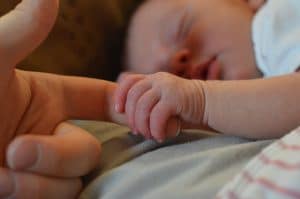What Are Your Ménière’s Disease Symptom Management Options?
Ménière’s disease is an uncommon disease characterized by hearing loss, tinnitus and impactful vertigo. It’s difficult to diagnose due to its symptoms resembling those...
Posted on September 27, 2019
AudiologyApproximately 2-3 out of every 1,000 babies are born with hearing loss in Pennsylvania. Recognizing the need to educate the public on the importance of newborn hearing screenings, the Pennsylvania legislature just passed a resolution designating September Newborn Screening Awareness Month.

Hearing loss negatively impacts the quality of life for people of all ages, but the consequences are even greater for babies born with impaired hearing. Infants and toddlers with hearing loss are likely to experience developmental delays in speech, language and social skills. Early intervention is key in improving a child’s communication skills and preventing learning and social problems that accompany hearing loss.
Recognizing this, the Centers for Disease Control and Prevention (CDC) and American Academy of Pediatrics (AAP) recommend a hearing screening for all babies before they are one month old. Most hospitals provide newborn hearing screenings immediately after birth or before babies are sent home.
Pennsylvania’s Newborn Hearing Screening and Intervention Program addresses these recommendations by stipulating that all babies receive a hearing screening within the first 30 days following birth; are diagnosed within three months; and receive treatment or intervention services within six months.
If a child does not pass the initial screening, they receive a follow-up screen at the hospital.
If they fail the follow-up, the child’s PCP is notified and the Department of Health becomes involved, monitoring infants to make sure they receive timely follow-up care and pediatric treatment for hearing loss. The Department also offers infant hearing screening, educational outreach, and training for physicians, nurses, audiologists, early intervention staff and other health care professionals.
Time is of the essence because most children learn to speak by the age of 18 months; without a newborn hearing screening, hearing loss goes undetected until the child is two and a half years old more than 50 percent of the time. By then, they have missed out on key developmental milestones and the odds of long-term social and academic issues are considerably higher.
State Representative Angel Cruz, Democratic chairman of the House Human Services Committee, sponsored H.R. 475, recognizing September as Newborn Screening Awareness Month, to raise awareness about the importance of Pennsylvania’s Newborn Screening and Follow-Up Program. Explains Cruz, “Early detection allows for early intervention to ensure all babies have a chance to live healthy lives. It’s vital that we raise awareness of the importance of these screenings.”
For more information on newborn hearing screenings or if you’d like to learn more about identifying hearing loss in children, contact one of our hearing health professionals today.
Doylestown
599 W State St, #201
Doylestown, PA 18901
(215) 345-5323
Abington
1245 Highland Ave, #502
Abington, PA 19001
(215) 886-1482
Spring House
909 Sumneytown Pike, #103
Spring House, PA 19477
(215) 646-2118
Ménière’s disease is an uncommon disease characterized by hearing loss, tinnitus and impactful vertigo. It’s difficult to diagnose due to its symptoms resembling those...
Otomycosis is a fungal ear infection affecting the outer ear. Fungal ear infections are less common than bacterial infections, making up 10% of all outer...
When two or more conditions occur together, they are said to be comorbidities. One set of comorbidities that may surprise you are hearing loss and shingles....
Have you ever wondered what exactly an audiologist does, besides look inside your ears with a lighted instrument? If you have been diagnosed with hearing...